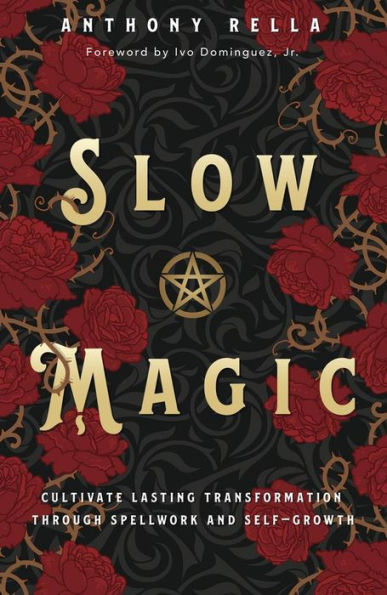You don't have to puzzle out what Anthony Rella is going to be talking to you about in his latest (as of early 2025) book. Titled Slow Magic: Cultivate Lasting Transformation Through Spellwork and Self-Growth, it's obvious that he's going to be shifting our focus away from the "do a thing, get a thing" nature of some kinds of magical workings. Rella has a professional background as a psychotherapist, and while I haven't met the man I'm presuming this has tremendous leverage in how he approaches metaphysical subjects. A spell to achieve a concrete task is one thing, but what one spell could simply conquer (for example) deep-seeded trauma responses?
Slow Magic is not a grimoire of spells and ingredient lists. It's much more akin to a manual of exercise or maybe a text on regional cuisine (but only through the techniques portion, not grandma's pasta sauce recipe.) Clearly, Rella is trying to guide the reader into a way of seeing magic and how it can interact with their life - and probably already does. There are quite a few practices offered up, in the nature of guided meditations and visualizations, types of tarot reads to perform, thought experiments on future outcomes, and more besides. I think one exercise that perfectly illustrates his way of seeing things is a tarot spread he calls "the Rose of Desire." In this spread you sort through your deck and select a card that represents an outcome you'd like to resolve in two weeks - so nothing about the far future, but nothing about today, either. That's going to be the last, 14th, card in the read. You also select a card that feels like your present circumstances; that's the 1st card. Laying the 14-card in the center, you then deal out cards in a slowly-unwinding spiral, placing your 1-card at the entrance of the spiral. I don't want to just rip the book off with a detailed recounting; the point is nothing about this sort of read is going to give a person a dopamine hit of instant results. On the other hand, doesn't life usually involve gradual change?
Aside from actionable steps and behaviors for the reader, Rella spends time on adversity and obstacles that are almost inevitable in a long-term process like the ones he describes. Probably my favorite chapter is Chapter 8: Traps and Fear. It is here that the author digs into the more subtle impediments that can inhibit your successful workings. For one example, he describes "the Trap of Too Much Control," the problem that having tremendous direct influence of circumstances could make a person unwilling to do something that would loosen that grip, even if that would be best for all involved. It would be impossible to describe concrete steps to take in the traps Rella describes since the details for each reader are going to be unique. Instead, he describes an exercise for plotting your escape which is much more about methods of examining the problem thoughtfully and thoroughly to uncover all of the angles.
This is a book I can easily recommend to readers who either are already prone to a contemplative nature or else are cognizant that they'd probably benefit from more of that in their life. Honestly, it's a book that people of any faith could get something out of if they were open-minded enough to see past the metaphysical language and recognize that the practical application of will and determination crosses all boundaries.
~review by Wanderer
Author: Anthony Rella
Llewellyn Publications, 2025
264 pages, $18.99 USD

